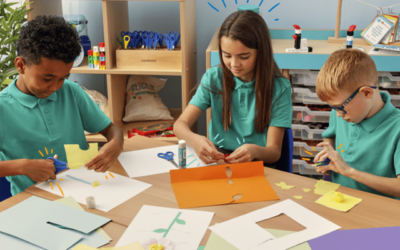Supporting Children’s Mental Health in Lockdown and Beyond
Supporting children’s mental health is so important in lockdown and beyond, by recognising the signs of poor mental health and learning how to deal with it.
This much is clear: the pandemic has had a dramatic effect on children’s mental health. While children often can’t understand the big-picture worries that adults deal with on an increasingly more frequent basis, our little ones (and not so little ones) are highly perceptive and will mirror or assimilate the feelings and emotions of the adults around them.
In a recent survey conducted by Save the Children, it was found that the lockdown has had a worrying impact on children’s wellbeing, with skyrocketing mental health issues which could continue to affect them long into the future.
“While children are resilient, we cannot underestimate the impact the pandemic is having on their mental wellbeing and overall health. [They] are suffering enormous upheaval on a scale that we have not seen in this lifetime. There have been many sudden changes to their lives and so much is yet unknown about the long-term impacts of this crisis, which requires us to be vigilant and do everything possible to limit the impact on young minds”, reveals Marie Dahl, Head of Save the Children’s Mental Health & Psychosocial Support Unit.
How can we spot signs of poor mental health in children?
You may find that children are quieter than normal, withdrawing from activities that usually bring them pleasure. In juxtaposition to this, you may see children displaying physical aggression and spurts of anger. Any change to a child’s normal personality may be a sign that their mental wellbeing is suffering.
You can also look for children that are not eating as they normally do, or children that are sleeping poorly or wetting the bed.
How can we help children with poor mental health?
Noticing that a child – whether it is your own or a child that you care for – is in mental distress can trigger your own feelings of worry and anxiety. Never fear though, there are actionable steps you can take straight away or even before you see signs of low wellbeing in the child in your care:
- Acknowledge their feelings. Children want to be heard and it is our job to listen to, and validate their fears. Even our youngest children need us to show that we can actively listen to them. Tell the child that it is ok to feel worried, sad or lonely and give them the time and contact that they need from you. If you are parenting at home, try to set aside at least 10 minutes at the start and end of every day to have quality time together away from technology (yes, that includes your phone!).
- Explain, in a child-friendly way, exactly when and why events are taking place. Don’t try to hide news but rather, cherry pick the parts that you know they can process and sit down to talk about them. Ask them how they are feeling about the changes and validate whatever they say: “It’s ok to feel that way.”
- Share how you are feeling too. Children learn how to process emotions from the adults around them. While you may think that hiding how you feel from your child is better for them, research has shown that children become better communicators, with a better ability to handle their emotions if the adults in their lives are honest and open too.
- Spend time in the great outdoors. Make the most of the guidelines and try to go outside once a day (or more if you are in a setting or home with access to the outdoors). Woodlands, beaches and open countryside are fantastic if you have them on your doorstep but even a walk around the houses will do everyone the world of good. If you would like to, you can make each walk interesting by trying to spot different things each time: how many cars, postboxes, different coloured front doors, animals etc.?
- Use your outdoor space to create a mud kitchen. Remember making mud pies? Yep, they’re still a thing! Allowing your child time to play outside in an unstructured way, without pre-planned agendas will be beneficial for all of you. Mud kitchen play can be adapted for children of all ages and what’s more, there are actually hundreds of hidden learning opportunities that children will access without even realising.
- Allow children time off from school work and try not to pack each day with online (or offline) learning opportunities. We all need time to recharge and this is applicable more often for children than for adults. This ‘free time’ can be spent however the child wishes and should be as important to timetable as that 9am Zoom phonics lesson.
- Try a spot of mindful meditation. Meditation may seem like something that is inaccessible to young children but it is easier than you think! Mindful colouring or painting, online yoga classes for children, making mandalas or even sitting still and taking a few deep breaths can make the world of difference.
For more expert advice and opinions visit our ‘expert opinions and advice’ section of the blog. For more information on mental health please visit the NHS website.

Sophie Pickles
Author
Sophie is an Early Years expert and mum of two and is passionate about child-led play, gentle parenting and learning outdoors! Sophie works as an Early Years consultant after spending many years leading and teaching in an outstanding Early Years setting. She has built her own global following of over 20,000 people on Instagram, Facebook and YouTube where she shares parenting tips, advice and play ideas for children from birth to three.
Related blogs
What Goes In, Must Go Out
Creating a Circular Economy in Your Nursery Author: Nick Corlett Sustainability Manager at LEYF Sustainability is more than a trend—it’s a shared responsibility, and the nursery is the perfect place to nurture these skills. Every day...
Top tips to create a SEND-Friendly Primary School Classroom
Author Lindsay Robinson Lindsay Robinson has been a primary school teacher for 23 years and is passionate about achieving the very best outcomes for children through quality first teaching and experiences. I remember receiving very little guidance during my teacher...
Celebrating being part of a Global Community
Author: Alice Sharp As a young teacher I can remember how much time and effort went into looking at the SHAP Calender. This is a calendar of festivals around the world. We had to try and ensure we celebrated anything relevant but also introduce other festivals from...


